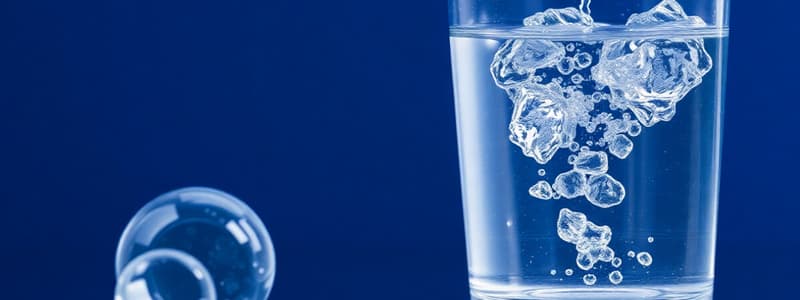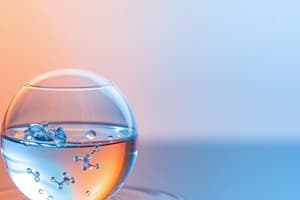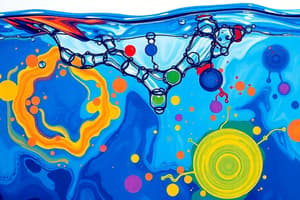Podcast
Questions and Answers
What is the reason water requires significant energy for vaporization?
What is the reason water requires significant energy for vaporization?
- Water's unique boiling point.
- Water vapor has a higher density than liquid water.
- Hydrogen bonds between water molecules. (correct)
- It has a low heat capacity.
How does the density of water change as temperature decreases below 4°C?
How does the density of water change as temperature decreases below 4°C?
- It remains constant.
- It decreases. (correct)
- It fluctuates randomly.
- It increases.
What phenomenon allows water to 'climb' up narrow tubes?
What phenomenon allows water to 'climb' up narrow tubes?
- Convection.
- Evaporation.
- Capillary action. (correct)
- Surface tension.
Which property of water allows organisms like raft spiders to exploit its surface as a habitat?
Which property of water allows organisms like raft spiders to exploit its surface as a habitat?
What critical role does the unique density of water play in aquatic ecosystems during freezing conditions?
What critical role does the unique density of water play in aquatic ecosystems during freezing conditions?
Why is water's high boiling point significant for aquatic organisms?
Why is water's high boiling point significant for aquatic organisms?
How does sweat function effectively for cooling the body?
How does sweat function effectively for cooling the body?
Which characteristic of water contributes to its high heat capacity?
Which characteristic of water contributes to its high heat capacity?
Flashcards
Latent Heat of Vaporization
Latent Heat of Vaporization
The amount of energy needed to change a liquid into a gas. Water has a high latent heat of vaporization due to strong hydrogen bonds between molecules.
Water Density and Freezing
Water Density and Freezing
Water's solid form (ice) is less dense than its liquid form, making ice float. This allows life to survive in cold temperatures by insulating water below the surface.
Water's Cohesion and Adhesion
Water's Cohesion and Adhesion
Water molecules strongly attract each other (cohesion) and other surfaces (adhesion). This allows water to climb up narrow tubes (capillary action), essential for plant life.
Boiling and Freezing Points of Water
Boiling and Freezing Points of Water
Signup and view all the flashcards
Specific Heat Capacity
Specific Heat Capacity
Signup and view all the flashcards
Cohesion
Cohesion
Signup and view all the flashcards
Adhesion
Adhesion
Signup and view all the flashcards
Surface Tension
Surface Tension
Signup and view all the flashcards
Study Notes
Water's Unique Properties
- Water's hydrogen bonding allows it to store more energy than other substances at a given temperature.
- Water has a high heat capacity—it resists temperature changes, crucial for biological systems.
- Water's high latent heat of vaporization requires significant energy to change from liquid to gas. This is due to the strong hydrogen bonds between water molecules.
Density and Freezing
- Liquid water is denser than ice, a unique property.
- Ice floats because it's less dense than liquid water.
- Ice's ability to float insulates bodies of water, preventing them from freezing solid, crucial for aquatic life.
- Water density changes with temperature changes, leading to ocean currents.
High Surface Tension and Cohesion
- Water molecules exhibit strong cohesion (attraction to each other) and adhesion (attraction to other substances).
- High cohesion leads to high surface tension, allowing certain organisms (like spiders) to walk on water.
- Capillary action is the movement of water through narrow tubes; this is due to both cohesion and adhesion.
- Capillary action is essential for water transport in plants.
Boiling and Freezing Points
- Water's high boiling point (100°C) and freezing point (0°C) are due to the strength of its hydrogen bonds.
- Water requires more energy to break these bonds than other similar molecules.
- Water's unique boiling and freezing points are important for aquatic organisms and temperature regulation in living things.
- The table compares water's boiling and freezing points to other substances.
Studying That Suits You
Use AI to generate personalized quizzes and flashcards to suit your learning preferences.




